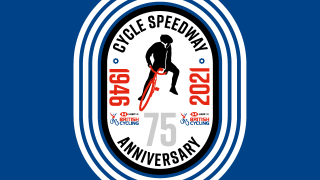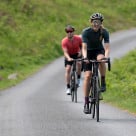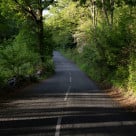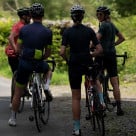This year marks the 75th anniversary of cycle speedway – one of the sport’s lesser known disciplines, but one which enjoys a rich heritage and continues to inspire fierce competition amongst clubs across the country to this day.
Originating in 1946 in post-war East London, cycle speedway’s early pioneers raced on stripped down bikes on roughly marked out tracks, and it wasn’t long before the sport had spread to all corners of the UK, spawning over 3,000 teams.
With an established racing calendar – including national championships for teams and individuals – developing in the early-1950s, many teams evolved into clubs with purpose-built tracks, helping the sport to build its profile and attract investment.
After establishing itself in Poland, the USA, Australia and elsewhere, world championships soon followed, and with it a worldwide community of friends knitted together by the love of doing battle over four laps of the hallowed 70-metre track.
Chair of British Cycling’s Cycle Speedway Commission, Mike Hack, traces his roots into the sport back to his primary school days in Manchester, and in his 55 years in the sport he has represented Great Britain in the inaugural Ashes series against Australia and supported the ongoing development of the sport as a referee, event organiser and club volunteer.
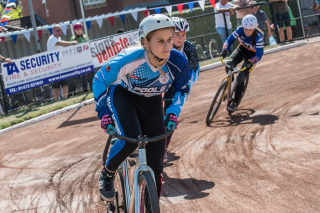
In 1989 he set up the Astley and Tyldesley Cycle Speedway Club, which continues to support riders from the ages of four to 75 to get on their bike to this day. Earlier this year the club was awarded a Heart of the Community Award by Wigan Council for his work with the club. For him, the appeal of cycle speedway is clear:
“We welcome people from all backgrounds in the club – some need help to get started, and others come ready to help others as volunteers, but it’s certainly not elitist. It’s fun to ride on the track, and you can get straight on there to give it a try.
“Many of our clubs run sessions where there isn’t formal racing or the pressure of competition, and riders can then just develop at their own pace. If they want to progress they can do, and if they don’t, that’s fine too!
“You also have the mix of individual and team competitions, which is unique for sport, and in cycle speedway it’s great that you can benefit from both. Just the camaraderie of being part of a team is enough for some riders, and there really is something for everybody.
“There’s a really strong veterans’ scene, including over 50s and over 60s categories, and we do really well when it comes to recruiting young people. Plenty of clubs are bringing in more and more young riders and female riders, which has been increasing now for the past 15 years, and the biggest challenge we face is keeping riders as they get into their teenage years and adulthood.”
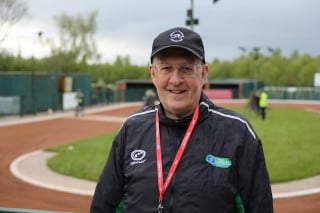
Like all grassroots sports cycle speedway has endured a challenging time during the pandemic, with club activities forced to cease due to lockdown and a number of major events – including the world and European championships and home internationals – rescheduled or cancelled due to the continued uncertainty of international travel.
While there are fears that the disruption of the past year may have caused some riders to leave the sport altogether, Mike remains optimistic about its future and is working hard with his fellow Commission members, British Cycling and others to ensure that it is well-placed to thrive in the future.
“I certainly welcome the long-term plan for the discipline, which has been an open and honest appraisal of where the sport is now, and a really good starting point for future development. The key areas of focus are improving the number of participants, number of clubs, facilities and working to raise the profile of the sport.
“There are plenty more great events and club activities taking place through the rest of the year, and I’d encourage anybody who is interested to come down and give it a go!”
British Cycling published its long-term plan for cycle speedway in June, as part of the Everyone Wins campaign. You can read the plan here, and find out more about the campaign here.

